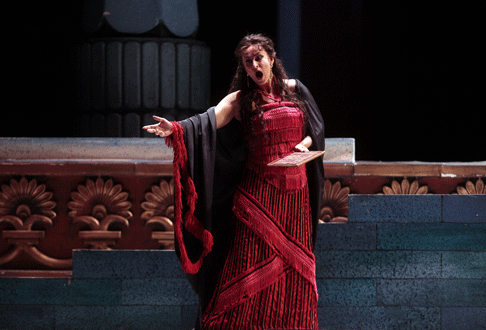Biaggi’s claim is no folderol; each principal in
PBO’s Nabucco (seen opening night December 10) offered a
performance of individual value, with the balance of the night’s success
tipping aptly on Mark Rucker’s Nabucco and on the playing of the Palm
Beach Opera Orchestra with principal conductor and artistic director Bruno
Aprea on the podium.
Mark Rucker presented fluent Verdi style, adding — of late —
further finesse to a cantabile line that already made him a notable
exponent of the style and period. The power-addled king’s delusions of
Acts II and III were conveyed in Rucker’s singing — fashioned with
portamento and diminuendos; he hit his stride vocally and
dramatically with a ‘Dio di Giuda’ both meditative and
conciliatory. This night’s Abigaille, Paoletta Marrocu, in her moments on
vocal spotlight made most of an impression with an often rich middle register
— mellifluously delivered in the more lyrical passages of ‘Anch'io
dischiuso un giorno.’ In between some hard, go-for-broke, high notes and
her seemingly unabashed use of discernible register breaks for dramatic effect,
Ms. Marrocu spun accurately articulated scales and rapped out the text with
biting authority.
Showing off an even bel canto line — that touched the F sharp
in his cabaletta — and a sizable, fleet instrument was bass
Dmitry Belosselskliy (Zaccaria). Laura Vlasak Nolen (Fenena) displayed fine
stage sense in the final act prayer, where she and Aprea collaborated with
Verdian strokes of refined rubato. Adam Diegel owns a large instrument
with lyric attributes that made short work of Ismaele’s lines. As the
High Priest of Baal, Harold Wilson brought a knowing gait and a fine bass. Palm
Beach Young Artists Evanivaldo Correa and Alison Bates did right by the roles
of Abdallo and Anna.
Grave majesty was missing from the opening of Nabucco’s
overture; once to the livelier section though, the playing of the orchestra
turned altogether superlative. Aprea’s conducting strikes as being
attentive and open to various facets of artistic nuance. In the overture, there
was a cohesive vitality that held through bouncy and bold and light and lyrical
passages with well-executed string and woodwind playing. Verdi’s markings
were honored to the end; and, in the manner of, Aprea was keen to push on or
allow singers rhythmic room as necessary. Both the orchestra and the Palm Beach
Opera Chorus reached a level of musical gravitas in ‘Immenso
Jeovha.’
 Paoletta Marrocu as Abigaille
Paoletta Marrocu as Abigaille
Stage director Guy Montavon and chorus were doubtless challenged by set
pieces (credit given to Opera de Montreal) with compact stage space. Though
conceptually beautiful, the Temple — swept in purifying soft shades of
blue, a motif for the sets — seemed randomly besieged by congregants. To
Montavon’s credit, the varying presence of Doric columns on a stage-wide
platform with stairs leading to two landings left little room downstage and
only a few feet from the pit to work with. Of “special mention”
quality is the lighting of David Gano — faintly fading across wide gulfs
of the color spectrum is analogous to mystifying and winding dramaturgical
currents in Act II.
Robert Carreras

